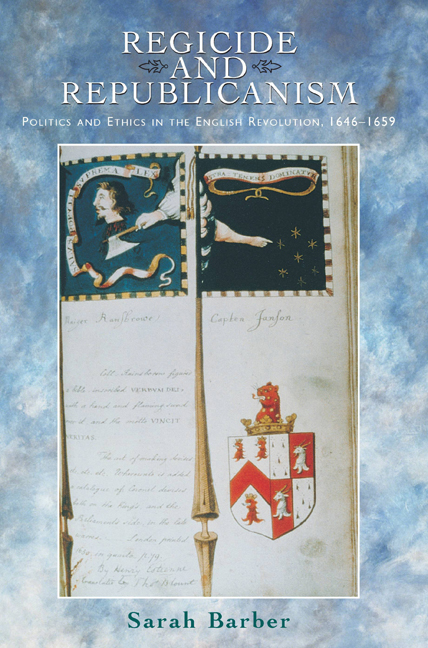Book contents
- Frontmatter
- Contents
- Preface
- List of Abbreviations
- Introduction: Regicide and Republicanism
- 1 Unparliamentary Language and the Dignity of the Crown
- 2 ‘A Mere Man’: Charles Levelled
- 3 The Expense of Blood and Treasure
- 4 King Ahab
- 5 Queen Justice
- 6 Government New Modelled?
- 7 The Engagement of Loyalty
- 8 The Active and the Passive Life
- Epilogue: The Good Old Cause
- Select Bibliography of Printed Sources
- Index
- Frontmatter
- Contents
- Preface
- List of Abbreviations
- Introduction: Regicide and Republicanism
- 1 Unparliamentary Language and the Dignity of the Crown
- 2 ‘A Mere Man’: Charles Levelled
- 3 The Expense of Blood and Treasure
- 4 King Ahab
- 5 Queen Justice
- 6 Government New Modelled?
- 7 The Engagement of Loyalty
- 8 The Active and the Passive Life
- Epilogue: The Good Old Cause
- Select Bibliography of Printed Sources
- Index
Summary
In tracing the gentry republicans, we have followed a debate about the king and kingship which travelled from the particular to the general. The starting point was a specific action by Charles which demanded a specific response. The argument then moved on to discuss the ways in which Charles had demonstrated a continuous history of immorality and finally concluded that this was the behaviour which could be expected from all kings. It was expressed in largely civilian and secular terms. However, a parallel debate was taking place, chiefly amongst the soldiers of the army, which was an apocalyptic expression of biblical exegesis. This account reversed the logical process which travelled from the particular to the general. It started from general biblical parables about the magisterial office and came finally to rest with a highly personalised condemnation of Charles Stuart.
Every man who enrolled in the parliamentary army was furnished with a copy of the Soldiers’ Bible, containing passages of Scripture which encouraged him ‘to fight the Lords Battels, both before the fight, in the fight, and after the fight’. In 1645, the New Model thus emerged out of a pre-existent culture in which the soldiery were appraised of their own religious role. Religion was an important means of keeping morale high. A mixture of Old and New Testament texts reminded soldiers of God's gracious promises to his army and to think of their enemies ‘as nothing, and the men that warre against thee as a thing of naught, (Isa. 54: 17).’ Recent historians have counselled against too literalist a view of the New Model Army ‘filled with preaching, praying and psalmsinging soldiers inspired by their chaplains’: the testimony of contemporaries, like Thomas Edwards, that the army was a breeding ground for sectarian anarchism, is suspect hyperbole. However, comforting resort to the word of God could ameliorate the physical and emotional insecurity fostered by the itinerant life of a soldier. Despite being warned against too literalist an interpretation of contemporary sources,there is no reason to doubt John Vicars’ account that the chaplains at Edgehill encouraged the soldiers to fight for ‘their Religion, Lawes and Christian Liberties’.
- Type
- Chapter
- Information
- Regicide and RepublicanismPolitics and Ethics in the English Revolution, 1646–1659, pp. 96 - 120Publisher: Edinburgh University PressPrint publication year: 2020



